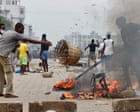
In a world rich with diverse cultures and complex politics, recent global events have cast light on the struggles and triumphs faced by nations and individuals alike. From social protests in Africa to vital legal judgments on women’s rights and gender issues, each development offers a unique glimpse into the current state of global affairs.
In the West African nation of Togo, a wave of protests has erupted, sparked by the controversial arrest of a rapper advocating for political change. Public demonstrations have become a poignant reminder of the desire for freedom and justice in the country. These peaceful protests, however, have unfortunately turned deadly, with at least 10 lives lost and numerous arrests made. The unrest has drawn attention to the call for President Faure Gnassingbé’s resignation, signaling a palpable demand for change.
Meanwhile, in Kenya, the tone of political discourse has shifted sharply, as President William Ruto amplified his stance against anti-government demonstrations. This comes in the wake of violent protests that resulted in the tragic loss of 31 lives. The president’s directive to police officers to incapacitate, rather than kill, protesters has sparked discussions on governance, security, and civil rights in the face of public dissent. It’s a critical moment in Kenya’s journey towards reconciling law enforcement with civil liberties.
On a more positive note, Leila Aboulela, a Sudanese author celebrated for her poignant storytelling, has been honored with the PEN Pinter Prize. Her work, which eloquently addresses themes of migration, faith, and the everyday lives of Muslim women, has been praised as both inspirational and enlightening. Aboulela’s recognition highlights the power of literature to bridge diverse cultures and shed light on personal experiences and societal truths.
In Afghanistan, a groundbreaking decision from the International Criminal Court (ICC) has brought international attention to the plight of women and girls. The ICC’s arrest warrants for key Taliban leaders, accused of perpetrating crimes against humanity, serve as a symbol of global solidarity in defending human rights. The action, hailed by activists worldwide, underscores the commitment to holding leaders accountable for policies that suppress fundamental freedoms and dignity.
Across the ocean in the United States, sweeping changes are on the horizon as the Trump administration announces significant reductions in NASA’s workforce. The planned cuts, aimed at decreasing federal government size, target roles rich with expertise and institutional knowledge. This decision has sparked a dialogue on the implications for scientific progress and the future of space exploration.
In another U.S. development, legal and cultural debates intensify as the Trump administration sues California over its policies allowing transgender athletes to participate in girls’ school sports. The lawsuit alleges a violation of Title IX, which prohibits sex-based discrimination, reflecting ongoing national conversations about gender identity, equity, and the scope of civil rights.
These stories, though emerging from diverse corners of the world, collectively weave a narrative of transformation, challenge, and the enduring quest for justice and equality. As nations, leaders, and individuals navigate these complex issues, one thing remains clear—the dialogue between past traditions and future aspirations continues to shape the fabric of our global community.
Source: {link}
